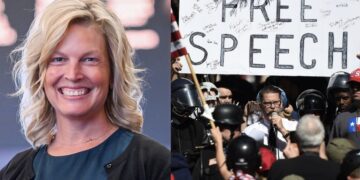If you don’t believe in the First Amendment for everybody, then you don’t believe in the First Amendment. One reaction to the violence in Charlottesville has been to call for restrictions on hate speech. The New York Times published an op-ed by K-Sue Park urging the ACLU to judge First Amendment claims in the context of broader struggles for equality. Nick Gillespie writes that this position is not only contrary to the First Amendment, it would be bad news for the least powerful among us:
“One way speech rights are under attack right now (as always) is the argument that they should not apply to disfavored speakers, who from Park’s perspective include right-wing racists and people organized as corporations. By asking the ACLU to think about freedom of speech ‘in a broader context,’ she is actually asking the ACLU to abandon the principle altogether. The whole point of the principle is that it applies regardless of who you are or what you are saying. If the ACLU gave up its ‘colorblind logic’ and started using racial and ideological filters to pick First Amendment cases, it would no longer be defending freedom of speech; it would be defending the interests of particular social and political groups.
“Freedom of speech does not require the ‘level playing field’ of Park’s dreams. It is obviously true that wealth helps people get their messages across. So do fame, good looks, and verbal felicity. But those advantages do not render freedom of speech a nullity, any more than applying the Fourth Amendment to mansions as well as shacks or guaranteeing due process to rich as well as poor defendants makes those protections meaningless. To the contrary, legally guaranteed rights matter most to people without the social and political connections that might provide protection from official harassment.” [Reason]
Against such calls to reconsider free speech rights for hate groups, the ACLU has buckled. It announced that it would no longer defend “hate groups seeking to march with firearms.” That’s a tragedy, David French writes:
“For all its flaws and inconsistencies in other areas, the ACLU had been one of the last well-resourced national legal organizations that were truly non-partisan in defending First Amendment freedoms such as the right to march and speak in Charlottesville. Indeed, a local ACLU chapter had defended the alt-right’s liberties at that very protest. But now the ACLU’s message was clear: lawfully exercise Second Amendment rights, and we’ll turn our backs on your First Amendment freedoms.
“The law already prohibits true threats, and there are an array of legal restrictions on the place and manner of ‘bearing’ arms depending on the jurisdiction and location. Under existing precedent, groups that engage in threats or violate local firearms laws face severe legal consequences. The ACLU’s position, however, is that it will not represent a category of organizations that are completely compliant with the applicable laws. […]
Thus, yet another negative result of last weekend’s deadly violence is that both the First and Second Amendments are under increasing cultural pressure. Rather than focus on the actual violence that caused so much pain and harm last weekend, activists are renewing calls for so-called hate-speech restrictions, and they’re increasing demands for restrictions on the right to bear arms. The ACLU is a key pressure point. Rights that don’t enjoy a robust defense are not rights at all. The Constitution is not a self-executing document.” [National Review]
The ACLU’s new stance isn’t really about the Second Amendment. It’s about finding a way to weasel out of defending the rights of people its membership does not like—without seeming to abandon its principles. Most rallies will have at least some people who legally carry firearms. (And after the events in Charlottesville, why wouldn’t marchers carry a gun for self-defense?) That means the ACLU’s new position allows it to decline to defend the rights of most groups it doesn’t like. But if you aren’t defending the principle for all, then you aren’t defending the principle at all.







